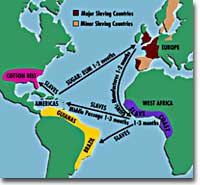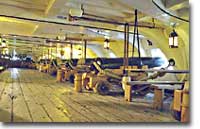14d. The Economic Crisis of the 1780s

The slave trade followed a triangular route between Europe, Africa and the Americas. European goods such as cloth and guns were traded for slaves in Africa, who were then taken to the Americas to work on plantations. The plantations produced products such as sugar and tobacco, which, in turn, were shipped back to Europe for sale.
The economic problems faced by the Congress deeply touched the lives of most Americans in the 1780s. The war had disrupted much of the American economy. On the high seas the British navy had great superiority and destroyed most American ships, crippling the flow of trade. On land, where both armies regularly stole from local farms in order to find food, farmers suffered tremendously.
When the fighting came to an end in 1781, the economy was in a shambles. Exports to Britain were restricted. Further, British law prohibited trade with Britain's remaining sugar colonies in the Caribbean. Thus, two major sources of colonial-era commerce were eliminated. A flood of cheap British manufactured imports that sold cheaper than comparable American-made goods made the post-war economic slump worse. Finally, the high level of debt taken on by the states to fund the war effort added to the economic crisis by helping to fuel rapid inflation.

There were 32 cannons on the lower gundeck of Her Majesty's Ship Victory, each attended by a 6-man crew. The War of American Independence (as the British call it) was the ship's first wartime assignment.
This economic crisis was a grave threat to individuals, as well as to the stability and future of the young republic. Independence had been declared and the war had made that a reality, but now the new republican governments, at both the state and national level, had to make difficult decisions about how to respond to serious economic problems. Most state legislatures passed laws to help ordinary farmers deal with their high level of debt. Repayment terms were extended and imprisonment for debt was somewhat relaxed.
However, the range of favorable debtor laws passed by the state legislatures in the 1780s outraged those who expected to be paid by debtors, as well as political conservatives. Political controversy about what represented the proper economic policy mounted and approached the boiling point. As James Madison of Virginia noted, the political struggles were primarily between "the class with, and [the] class without, property." Just as the republican governments had come into being and rethought the meaning of popular government, economic crisis threatened their future.






